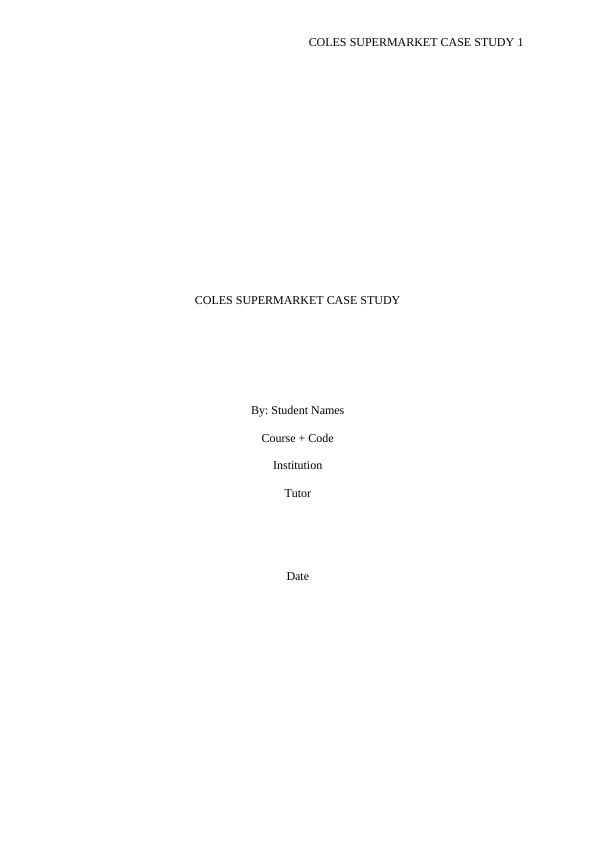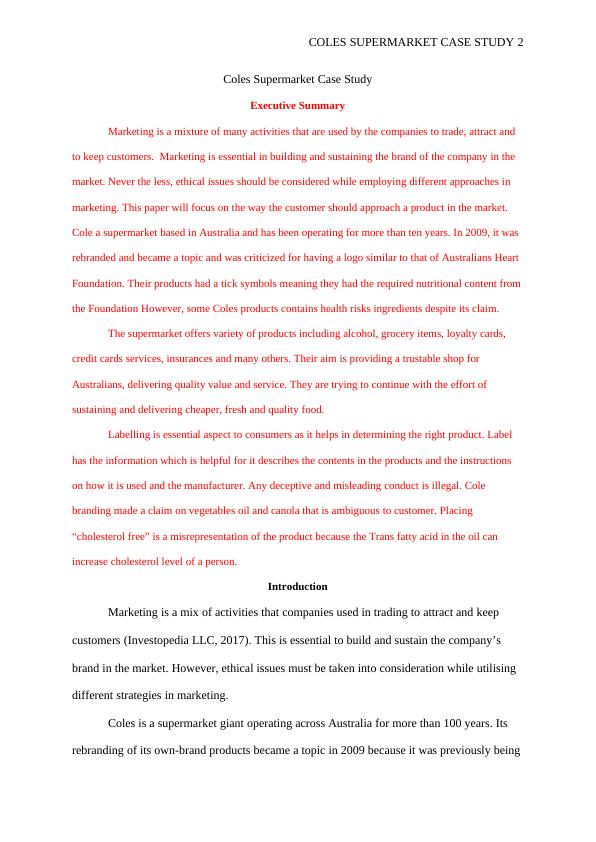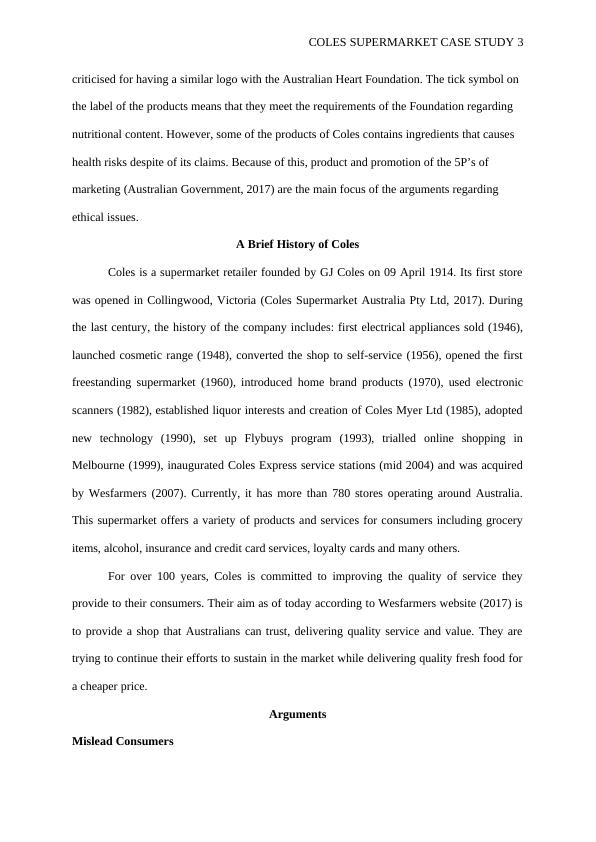Coles Supermarket Case Study
10 Pages2481 Words428 Views
Added on 2020-03-16
About This Document
Marketing is a mixture of many activities that are used by companies to trade, attract, and keep customers. This paper will focus on the way the customer should approach a product in the market. Cole a supermarket based in Australia and has been operating for more than ten years. We will analyze Business Ethics in decision-making. Ethical issues must be taken into consideration while utilizing different strategies in marketing.
Coles Supermarket Case Study
Added on 2020-03-16
ShareRelated Documents
COLES SUPERMARKET CASE STUDY 1COLES SUPERMARKET CASE STUDYBy: Student NamesCourse + CodeInstitutionTutorDate

COLES SUPERMARKET CASE STUDY 2Coles Supermarket Case StudyExecutive SummaryMarketing is a mixture of many activities that are used by the companies to trade, attract and to keep customers. Marketing is essential in building and sustaining the brand of the company in the market. Never the less, ethical issues should be considered while employing different approaches in marketing. This paper will focus on the way the customer should approach a product in the market. Cole a supermarket based in Australia and has been operating for more than ten years. In 2009, it was rebranded and became a topic and was criticized for having a logo similar to that of Australians Heart Foundation. Their products had a tick symbols meaning they had the required nutritional content fromthe Foundation However, some Coles products contains health risks ingredients despite its claim. The supermarket offers variety of products including alcohol, grocery items, loyalty cards, credit cards services, insurances and many others. Their aim is providing a trustable shop for Australians, delivering quality value and service. They are trying to continue with the effort of sustaining and delivering cheaper, fresh and quality food.Labelling is essential aspect to consumers as it helps in determining the right product. Label has the information which is helpful for it describes the contents in the products and the instructions on how it is used and the manufacturer. Any deceptive and misleading conduct is illegal. Cole branding made a claim on vegetables oil and canola that is ambiguous to customer. Placing “cholesterol free” is a misrepresentation of the product because the Trans fatty acid in the oil can increase cholesterol level of a person.IntroductionMarketing is a mix of activities that companies used in trading to attract and keep customers (Investopedia LLC, 2017). This is essential to build and sustain the company’s brand in the market. However, ethical issues must be taken into consideration while utilising different strategies in marketing.Coles is a supermarket giant operating across Australia for more than 100 years. Its rebranding of its own-brand products became a topic in 2009 because it was previously being

COLES SUPERMARKET CASE STUDY 3criticised for having a similar logo with the Australian Heart Foundation. The tick symbol on the label of the products means that they meet the requirements of the Foundation regarding nutritional content. However, some of the products of Coles contains ingredients that causes health risks despite of its claims. Because of this, product and promotion of the 5P’s of marketing (Australian Government, 2017) are the main focus of the arguments regarding ethical issues. A Brief History of ColesColes is a supermarket retailer founded by GJ Coles on 09 April 1914. Its first storewas opened in Collingwood, Victoria (Coles Supermarket Australia Pty Ltd, 2017). Duringthe last century, the history of the company includes: first electrical appliances sold (1946),launched cosmetic range (1948), converted the shop to self-service (1956), opened the firstfreestanding supermarket (1960), introduced home brand products (1970), used electronicscanners (1982), established liquor interests and creation of Coles Myer Ltd (1985), adoptednew technology (1990), set up Flybuys program (1993), trialled online shopping inMelbourne (1999), inaugurated Coles Express service stations (mid 2004) and was acquiredby Wesfarmers (2007). Currently, it has more than 780 stores operating around Australia.This supermarket offers a variety of products and services for consumers including groceryitems, alcohol, insurance and credit card services, loyalty cards and many others. For over 100 years, Coles is committed to improving the quality of service theyprovide to their consumers. Their aim as of today according to Wesfarmers website (2017) isto provide a shop that Australians can trust, delivering quality service and value. They aretrying to continue their efforts to sustain in the market while delivering quality fresh food fora cheaper price.ArgumentsMislead Consumers

End of preview
Want to access all the pages? Upload your documents or become a member.
